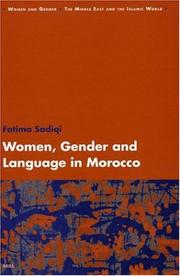| Listing 1 - 1 of 1 |
Sort by
|

ISBN: 9004128530 9789004128538 1423755448 9781423755449 1280914718 9786610914715 9047404378 Year: 2003 Publisher: Leiden Boston
Abstract | Keywords | Export | Availability | Bookmark
 Loading...
Loading...Choose an application
- Reference Manager
- EndNote
- RefWorks (Direct export to RefWorks)
This volume deals with the complex but poorly understood relationship between women, gender, and language in Morocco, a Muslim, multilingual, multicultural, and developing country. The hypothesis on which the book is based is that an understanding of gender perception and women's agency can be achieved only by taking into account the structure of power in a specific culture and that language is an important component of this power. In Moroccan culture, history, geography, Islam, orality, multilingualism, social organization, economic status, and political system constitute the superstructures of power within which factors such as social differences, contextual differences, and identity differences interact in the daily linguistic performances of gender. Moroccan women are far from constituting a homogeneous group, consequently the choices available to them vary in nature and empowering capacity, thus 'widening' the spectrum of gender beyond cultural limits.
Arabic language --- Berber languages --- Language and culture --- Sexism in language --- Women --- Sex differences --- Sex differences. --- Morocco. --- Language. --- Sexist language --- Language and sex --- Language and languages --- Nonsexist language --- Culture and language --- Culture --- Libyan languages --- Afroasiatic languages --- Semitic languages
| Listing 1 - 1 of 1 |
Sort by
|

 Search
Search Feedback
Feedback About UniCat
About UniCat  Help
Help News
News